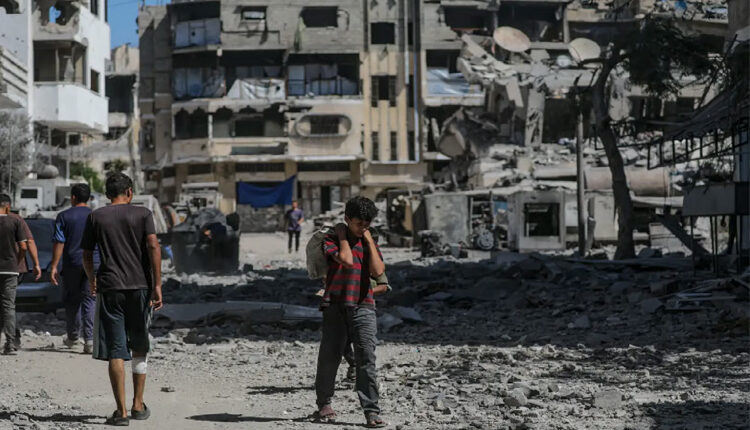
THE GAZA WAR AND THE SHIFTING GLOBAL ORDER-LINKING THE ONGOING EFFECT TP THE DECLINE OF US INFLUENCE AND THE RISE OF MULTIPOLARITY
By: GUL WAJID ABBASI
The Gaza War is not merely a regional conflict; it is an encouragement for a fundamental shift in the global order dynamic, increasing the decline of American influence and creating a way for a more multipolar world. The United States unwavering diplomatic and military support for Israel’s actions has not only ruined its moral standing but has also exposed the limits of its power and its perceived hypocrisy, prompting nations to seek alternative centers of power and alliances.
For many years, the United States has seen itself as the top global leader, a country whose moral influence helped shape the international system. However, the conflict in Gaza has seriously harmed this image. The large amount of destruction and the number of civilian deaths, widely shared on social media and international news, have caused strong global criticism. Despite this, the US is the only major power that has kept blocking UN Security Council votes for a ceasefire, and it has kept sending military help to Israel, even as human rights groups and UN officials have warned about possible war crimes. This has led to a view of the US being unfair and inconsistent. Its strong support for a system based on rules and human rights in other places, like Ukraine, now feels empty to many countries in the Global South and even some of its longtime allies. This dishonesty has hurt America’s reputation and made it harder to get support for its other foreign policies. Its effort to closely support Israel while trying to guide its actions has not worked well, showing how limited its influence really is.
As the United States influence decreases, other countries are taking a more active role, making the idea of a multipolar world more real. China and Russia have been more critical of Israel’s military actions, supporting a growing worldwide agreement. At the United Nations, they have regularly supported ceasefire resolutions, presenting themselves as defenders of international law and advocates for those who are oppressed, which is the opposite of the United States position. Although their reasons are likely to challenge American dominance, their actions connect with many people who are unhappy with the current global situation.
This isn’t just a battle over stories and ideas. Countries are looking for new friends and agreements beyond the usual US-centered system. The BRICS group, which has added new members like Egypt and the UAE, is becoming more influential as a group that provides an alternative to the Western-led G7. The Gaza war has made it clear that such alternatives are needed, where countries can talk and take action on global problems without being controlled by one powerful nation. This change shows the world is moving away from a single-power structure to a more complicated and spread-out way of handling power.
The Gaza war has also changed the Middle East, a region where US influence has been strong for a long time. The Abraham Accords, once seen as a key part of a new US-driven order in the region, are now under a lot of strain. Even though the accords are still in place, talks between Israel and Saudi Arabia have stalled because of public anger over the war and its effects on civilians. This has shown that trying to ignore the Palestinian issue in favor of Arab-Israeli relations is not working.
At the same time, the war has given more power to groups and countries that challenge US interests.
The Houthi attacks on ships in the Red Sea have caused global economic problems, and the US has struggled to control the spread of the conflict into other areas. The war has also strengthened the “Axis of Resistance,” led by Iran, which has been able to bring together its allies and proxies, weakening US influence and causing instability in the region. The Middle East is becoming a place where many different groups are competing for power, and the US is just one of many players, not the main one deciding what happens.
The Gaza war has also shown how fragile the international system has become since the Cold War.
The UN is not working well, international law isn’t effective when political will is weak, and there’s a big divide between the Global North and South on important issues like justice and human rights. All of this points to a system in trouble. The US has failed to calm the situation and has continued to support a military campaign that has caused a lot of suffering for civilians. This has damaged its reputation and shown the limits of its claim to be essential in world affairs. The world is moving toward a more unpredictable system of power, where power is spread out, alliances change often, and old rules don’t work anymore. The Gaza war didn’t start this change, but it has definitely sped it up, making it a key moment in the transformation of the global order.



Comments are closed, but trackbacks and pingbacks are open.